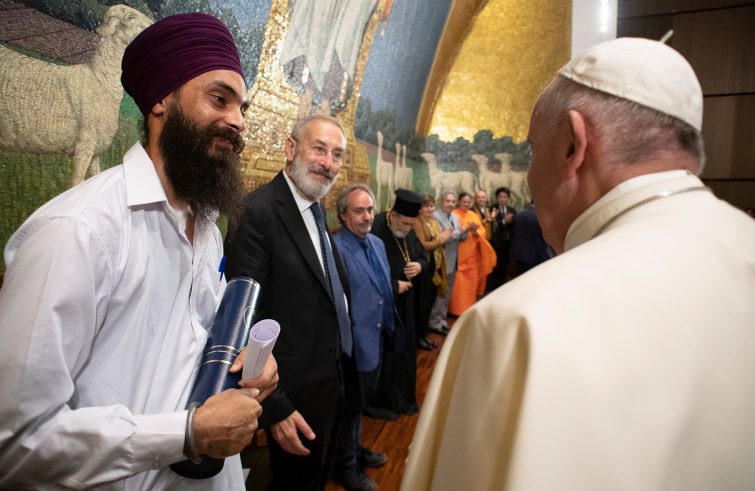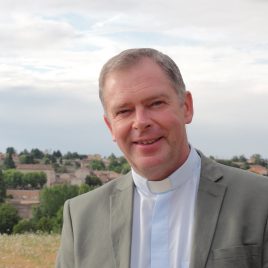
The Mediterranean context calls for an increasingly incarnate theology to better understand the religious life of the local Churches, to embrace their richness and their efforts, and to support the Church’s commitment to building a Mediterranean of peace. Thanks to the Institut Catholique de la Mediterranée (ICM) in Marseille, a Mediterranean theological network has been created, which includes the research programme “The Mediterranean as a theological space”, and which involves several countries and many Italian theological institutes, including the Pontifical Theological Faculty of Southern Italy and the Apulian Faculty of Theology. SIR interviewed Father Patrice Chocholski, Director of the ICM.
 Fr Patrice, how did this partnership between the ICM and the research group on “The Mediterranean as a site of theology” come about?
Fr Patrice, how did this partnership between the ICM and the research group on “The Mediterranean as a site of theology” come about?
The Catholic Institute of the Mediterranean (Institut Catholique de la Mediterranée) in Marseilles was created to respond to the local challenges of cultural and religious diversity:
30 years ago, at the Synod of Marseille, the faithful asked for a better understanding of existing religions, that is, the science of religions, and to give a more precise account of their faith to members of non-Catholic faiths, that is, the theology of religions. The reference made by Pope Francis in Naples in 2019 to a theology of welcome for the Mediterranean had a strong resonance. This led to contacts with the San Luigi Institute in Naples to discuss the background to the meeting with Pope Francis in Naples, and to an invitation from the Institute’s leaders to share the Marseille experience with them. This is how our collaboration and friendship was born, sharing our conventions, our relations with other institutes in the North, South and East of the Mediterranean. We had an existing convention with the Catholic University of Beirut, in Lebanon, with the Desire in Rome, we collaborated with the ISCREB in Barcelona, with the Ecumenical Institute of Rabat, in Morocco, with institutes in Cairo and with the Dominicans in Istanbul. Members of our network met with the Italian network, chaired by Giuseppina De Simone. We agreed to meet in Marseille in September 2022 to celebrate the 30th anniversary of the Marseille Institute with a colloquium, and this gave us the opportunity to come together to create a network for research, teaching and consultation. We thought about how we could benefit each other, also because Pope Francis, in his speech in Naples in 2019, called on us to work in a network.
How did this project develop?
We started by using video conferencing to share our research on the theology of the Mediterranean, on the work that we had done on both sides. Then we went on to share both in-person and online courses. For example, here in Marseille, we asked a professor from Naples, one from Barcelona and another from Rabat to give a lecture for our course, and we realised that all this was possible after the pandemic because each institute made an effort to make the best use of the new technologies. During our meeting in Marseille last September, we thought about how we could support or complement each other. We saw that our research on the theology of religions could be useful for the other institutes, while the Italian network has been working hard on the theology of the Mediterranean as a theological site, in collaboration with several university faculties and departments, not only of theology but also of sociology and history, which is very important for us.
What is the possible outcome of this collaboration?
We now understand that we can progress in this joint endeavour and share research articles, online research, lectures and courses with training modules developed by both institutes.
We understand that together we are stronger and that we can offer advice.
France has a clear separation of Church and State, with French-style secularism, but local authorities often need advice on religious studies or on practical cases. During religious festivals, or when the regional government wants to organise a cooperation event with a city in partnership with Marseille, the region proposes dates and asks for our advice. These events are often planned for Fridays or Saturdays, which would be a problem for Muslims and Jews.
We also offer our support to football teams – for example, here we have the Olympic de Marseille football club – to ensure that religion is not an obstacle but part of the solutions, as Pope Francis says. We train educators with the football teams to bring together and share the foundations of the different cultures and religions of the footballers, because the religious or even esoteric dimension is everywhere, even in a secular country.
There have been stories of witchcraft, like the one involving the footballer Pogba. These issues should be taken into account in intercultural and interreligious dialogue, not as obstacles but as synergies. Here in Marseille, entrepreneurs from large companies have asked us to train them in intercultural and interreligious dialogue, because they realise that mutual understanding, including cultural and religious understanding, leads to cooperation and that if we don’t understand each other, we are blocked.
This shows that our Mediterranean Institutes can be stronger together, working in a network that offers advice to Mediterranean companies and local communities, contributing to economic and social life with our specific characteristics. It is a way of reaching out to the peripheries and to educational needs.
Here in Marseille, we have some of the poorest suburbs in Europe, and we have received requests for training from educators who are working with people from different cultural backgrounds. France is a very secular country, and local communities are reluctant to ask for the contribution of religions in the name of secularism, but they realise that cultural issues cannot be addressed without involving religions, because culture influences religion and vice versa. Dialogue is necessary, even local lay institutions and associations are aware of this, and when we propose educational programmes together with a rabbi and an imam and other representatives of Christian denominations, everyone benefits from their contribution. We are aware that as a Mediterranean network we can not only organise courses or carry out joint research activities that complement each other, but we can also offer advice to local communities in order to extend our reach to the peripheries.
The meeting of the Bishops of the Mediterranean will take place in Marseilles next September, can you tell us something about it?
The meeting of Bishops in Marseilles will focus on dialogue between about sixty bishops and the same number of young people from the whole Mediterranean region.
In this third event, following the meetings in Bari and Florence, the theologians will reflect on the dialogue between bishops and young people in order to see what progress has been made since the first two events in Bari and Florence and how it can be continued. Meanwhile, we are working on a theological programme document, a project that is benefiting from the contributions of theologians from countries around the Mediterranean.
In this third step, in Marseilles, we will therefore continue to explore ways in which theologians and academics can serve the subsequent meetings of Bishops and be at the service of the encounter of peoples from the different shores of the Mediterranean. To make possible a vision of peace and not of death.
Who is involved in the debate on how to contribute to a Mediterranean of peace?
Muslim and Jewish university students from Israel, Lebanon, Turkey, Egypt, Morocco, Romania – the small part of the Black Sea that we call the Mediterranean – also take part in these meetings. Although there are Christian theologians, there is a need to listen to and connect with Islamic and Jewish theologians, and of course with Orthodox theologians, with the Croatian network and with the Romanian and Cypriot networks.
As a result of the strong intuition of Pope Francis, classical theology, thanks to the Mediterranean, is developing into a theology of relationships; it is clear that with the Mediterranean we are “forced” to understand theology precisely as “in-between”.
The “in-between” reflects the plurality of cultures, of peoples, we are always “in-between” and this compels us to conceive theology starting from dialogue, from the relationship, as Jesus did, from the encounter. This causes everything to change, it can be frightening, because the Spirit blows where He wants to, with as much force as He wants. If we look at this and accept this shift to remain in the “in-between”, we will find that we are engaged in a Trinitarian dialogue through all these peoples who require us to find our place in the “in-between” of dialogue. Let us not stop saying what Christian distinctiveness means, but let us continue to rediscover it, because the Jesus of the Gospel is rediscovered in human relationships and encounters, in the ‘in-between’.
This journey makes theology much more incarnate, more evangelical. A theology of welcome and encounter, a theology of respect and mercy, because true encounter, as Martin Buber said, happens when we are in the presence of the other. If we want to meet the face of God, we must meet the face of our brother or sister. But the encounter must be authentic, it cannot be shaped by strategies, political agendas or proselytism. For the relationship to be authentic, there must be a combination of justice and mercy. The Mediterranean offers us this opportunity.


